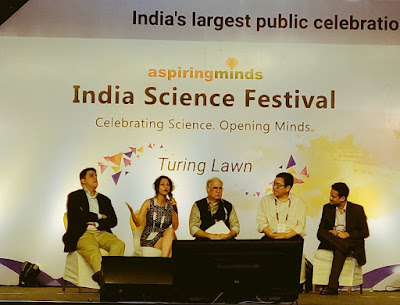Appointed Editor for the Communication and Media Section in the new University of California Press Journal-Global Perspectives
Global Perspectives (GP) is an online-only, peer-reviewed, transdisciplinary journal seeking
to advance social science research and debates in a globalizing world,
specifically in terms of concepts, theories, methodologies, and evidence bases.
GP is devoted to the study of global patterns and developments across a wide
range of topics and fields, among them trade and markets, security and
sustainability, communication and media, justice and law, governance and
regulation, culture and value systems, identities, environmental interfaces,
technology-society interfaces, shifting geographies and migration.
I will be leading the Communication and media section with Helmut K. Anheier from the Hertie School of Governance, Berlin, Germany serving as the Editor-in-Chief.
GP sets out to help overcome national
and disciplinary fragmentation and isolation.
GP starts from the premise that the world that gave rise to the social
sciences in their present form is no more. The national and disciplinary
approaches that developed over the last century are increasingly insufficient
to capture the complexities of the global realities of a world that has changed
significantly in a relatively short period of time. New concepts, approaches and forms of
academic discourse may be called for. GP has been organized by subject sections
carrying equal weight, which are informed by major conceptual or empirical
issues or grounded in traditional disciplines, while always inviting
significant interdisciplinary and transdisciplinary approaches.
I have an amazing board of global and renowned scholars to
work with for the launch of this new endeavor. The members are as follows:
-
Lina Dencik, Cardiff
University, UK
-
Terry Flew, Queensland
University of Technology, Australia
-
Mark Graham, University of
Oxford, UK
-
KoenLeurs, Utrecht University, Netherlands
I have written a brief theoretical launching point for this section:
The ‘global turn’ in media
and communication demands new ways of conceptualizing relations and boundaries
between the local, the national and the transnational. In recent years,
ubiquitous computing, mobile technologies and social media have amplified the
urgency to unpack the globalizing of media platforms, communication patterns
and processes as well as their underlying politics and policies.
While the media continues
to be implicated in the “disjunctures between economy, culture, and politics”
as Arjun Appadurai astutely observed a quarter century ago, their digital
cultures have created new opportunities and discontinuities at a global scale
that require a prolonged and thoughtful investigation.
Speculations about the fate
of traditional mass media like print, radio and television continue to be of
rising concern in academic and industrial research. The rise of user-generated
content has challenged conventional framings of media producers and audiences
bound by the nation state. For example, bloggers, podcasters, online
celebrities, digital activists and citizen journalists can shape global public
opinion and the media landscape at large.
As a few digital platforms
control the vast amount of data generated through everyday communicative
practices worldwide, scholars across disciplines are rightfully concerned about
who gets to collect, curate, store and moderate such media content. What is
driving the expansions in media infrastructures and policies and is there a
unified and shared logic to their organization? What are the implications of
new media technologies for politics and governance at national and
international levels?
We have witnessed a
significant shift in discourses surrounding globalization and media, from a
celebratory to a more critical stance. Only a decade ago, studies were tethered
to the notion of the “networked society” of collective intelligence,
participatory knowledge-making, community-building and activism. Today, we
appear less optimistic, as scholars sound the alarm on new forms of
discrimination, alienation, and victimization through uninterrupted
datafication, predictive analytics and automation of the “surveillance
society.”
While big data did not
reify into an “end of theory” as prematurely envisioned, we hesitate to ask the
big questions that can best encapsulate the interconnectedness of information
flows and the intersectionality of their datasets. It remains a challenge to
“decenter” and “decolonize” the global to stay clear of a singular and
universal logic to explain the social order of global media. This endeavour
beseeches a re-examination of past formulations of information/media systems,
as well as a critical assessment with the velocity, variety and volume and
other such rubrics posited to define new media architectures and practices.
Global Perspectives invite scholars across disciplines and fields to submit their empirical
and theoretical studies that are at the fulcrum of deliberations on the
“global” in media and communication networks. We find ourselves at an important
juncture that requires moving beyond staid dualities, traditional framings, and
descriptive media comparative work.
How do we transcend the
binaries of the online-offline, the public-private media sphere, “data rich”
and “data poor,” producer and consumer, homogenization and heterogenization,
media convergence and divergence, disembodiments and the situated materiality
of media imaginaries to the contextual integrity of the media event? What
alternative frameworks, systems, etymologies and ontologies are on offer to
reconfigure our understandings of how global media are organizing the power
relations in society?
In this context, we invite
papers to propose methodological innovations and conceptual alternatives to the
approach of the dialect between media and the global. Should we continue to use
the nation state as a central unit of analysis or push for a provincializing or
translocating of the global in Media studies? Are we giving too much primacy to
data in untangling global digital cultures and overestimating their influence?
How do we conceptualize the global transformations of the traditional media
without being too medium or user centric? These are some of the many issues
contributor to the Global Perspectives are welcome to address.




Comments
Post a Comment